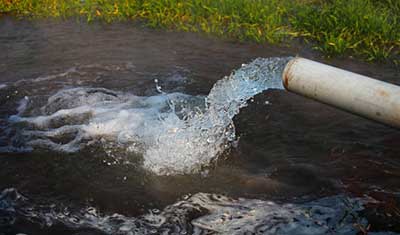Relevance: GS-3: Indian Economy and issues relating to planning, mobilization, of resources, growth, development; Agricultural produce, issues and related constraints.
Key Phrases: World Water Day, The Energy and Resources Institute (TERI),hydrologic cycle, Jal Jeevan Mission, NITI Aayog, Water Usage Charge, Water Pricing, Atal Bhujal Yajana.
Why in News?
- Today, on March 22, the world has observed— World Water Day on the theme ‘Groundwater: making the invisible visible’.
- The day has been celebrated since 1993, this Day raises awareness of about 2.2 billion people living without access to safe water.
- The broad aim of this Day is to put the spotlight on groundwater management, enhance knowledge exchange and create awareness of the importance of groundwater.
What are the observations regarding groundwater usage highlighted in the Editorial ?
- India world’s largest user of groundwater:
- In India, out of available water resources of 1,123 billion cubic meter (bcm), 433 bcm comes from groundwater and the remaining from surface water.
- Groundwater is the main source of domestic water supply for both rural and urban areas as more than 80 percent of supply is sourced through it, making the nation the largest user of groundwater in the world.
- Overexploitation of groundwater-' a New Normal in India':
- The agriculture sector uses 89 per cent of the groundwater for irrigation while 11 percent is used by the domestic and industrial sectors.
- Excessive extraction of groundwater has made almost 22 per cent of the assessed blocks critical or overexploited.
- In some states like Punjab, Haryana, Rajasthan and Delhi groundwater extraction is more than 100 per cent.
- Groundwater became the 'victim of ease-in-accessibility' :
- There are about 8,000 major and small townships in the country and most of them depend on groundwater due to its easy accessibility.
- The construction of private tube wells, especially in housing colonies and multi-storey buildings, is going on unchecked and, as a result, dependency on groundwater, especially in big cities, has increased manifold times.
- Groundwater also plays a significant role in regulating the economy
of many cities:
- According to a study by The Energy and Resources Institute (TERI), as much as a third of the GDP of cities like Lucknow is directly dependent on groundwater.
- By 2030, the country’s water demand is projected to be twice the available supply, implying severe water scarcity for hundreds of millions of people and an eventual about 6 percent loss in the country’s GDP.
- Reasons associated with groundwater over usage:
- Excessive exploitation of groundwater in agriculture.
- Unplanned urbanisation and associated concretisation are considered as the major causes of the declining water table.
- Global warming-induced climate change affects the hydrologic cycle and increases the variability of water supply, especially surface water.
- This overexploitation-cum-variability puts more pressure on groundwater. Thus, recharging groundwater is sine qua non.
- A good start with 'Jal Jeevan Mission' :
- To ensure universal access to drinking water, the government has launched Jal Jeevan Mission which aims to provide water tap connection to rural and urban households.
- This will result in connection to more than 10 crore households in rural areas and 2.68 crore households in urban areas by 2024.
- Under JJM (rural), single village groundwater-based schemes with end-to-end source sustainability will be encouraged in groundwater-rich areas.
- In places where groundwater is not abundant, especially in the designated dark blocks and in areas affected by water quality issues, surface water based multi village schemes will be promoted.
What are the various measures suggested by the Editor for optimum utilisation of Groundwater ?
- Rainwater harvesting and artificial groundwater recharge:
- According to a report by NITI Aayog, if methods for water conservation in India were not adopted, around 20 cities including Bengaluru, Delhi and Hyderabad would run out of groundwater in the next few years.
- The only viable and sustainable solution is rainwater harvesting and artificial groundwater recharge need to be adopted in a mission mode, across the country.
- Effective implementation of 'Water Usage Charge' and 'Water Pricing'
:
- Most of the States have neither put in place legislation for protecting water bodies nor enabling water harvesting in buildings.
- Adequate pricing of water — is still far from becoming a reality.
- There is wide variation in the percentage of households being charged for water, with the average being about 45 per cent in non-Himalayan States.
- Attitudinal changes and moral responsibility must imbibe through
social campaigns:
- Community engagement in urban and rural areas is necessary to create a sense of responsibility among the masses.
- Water help groups/water users associations , with members trained to take care of water conservation activities at the local level, must be formed.
- Easy line of credit for implementation of water conservation measures should be made available to the groups.
- Rationalizing of commercial usage:
- Commercial water user groups should be formed and engagement of commercial and bulk users in groundwater management must be ensured.
- Probably, a mechanism similar to ‘fire safety control’ needs to be placed for water conservation in premises of every commercial user having a specifically designated team of water warriors within the organisation.
Conclusion:
- For sustainable use of water, efficient management of groundwater is a must.
- Human induced climate change calls for conserving groundwater through efficient recharge and sustainable management.
- Innovative technologies like air-to-water systems, de-centralised wastewater treatment systems, construction of ‘green’ and ‘grey’ infrastructure like separate drains for stormwater management will reduce pressure on groundwater.
- The initiatives like Atal Bhujal Yajana is a step in the right direction for groundwater mapping and management. This will create more awareness of groundwater resources and their effective conservation.
Source: The Hindu BL
Mains Question:
Q. There is a need to create an ecosystem where the farmers and industrialists have the awareness of sustainable usage of groundwater. How far do you think that a new national water policy could help in this direction? (10 marks).



















